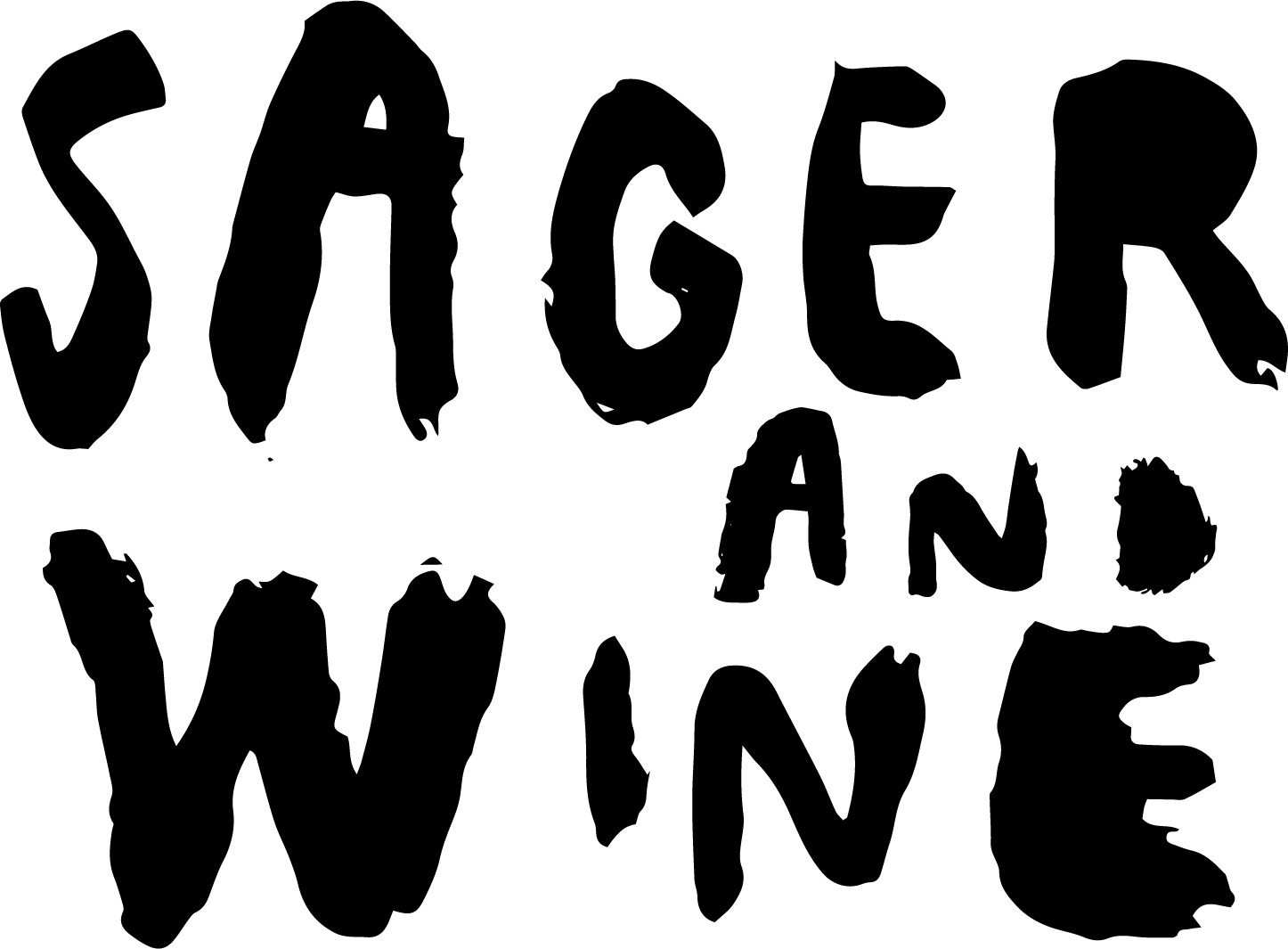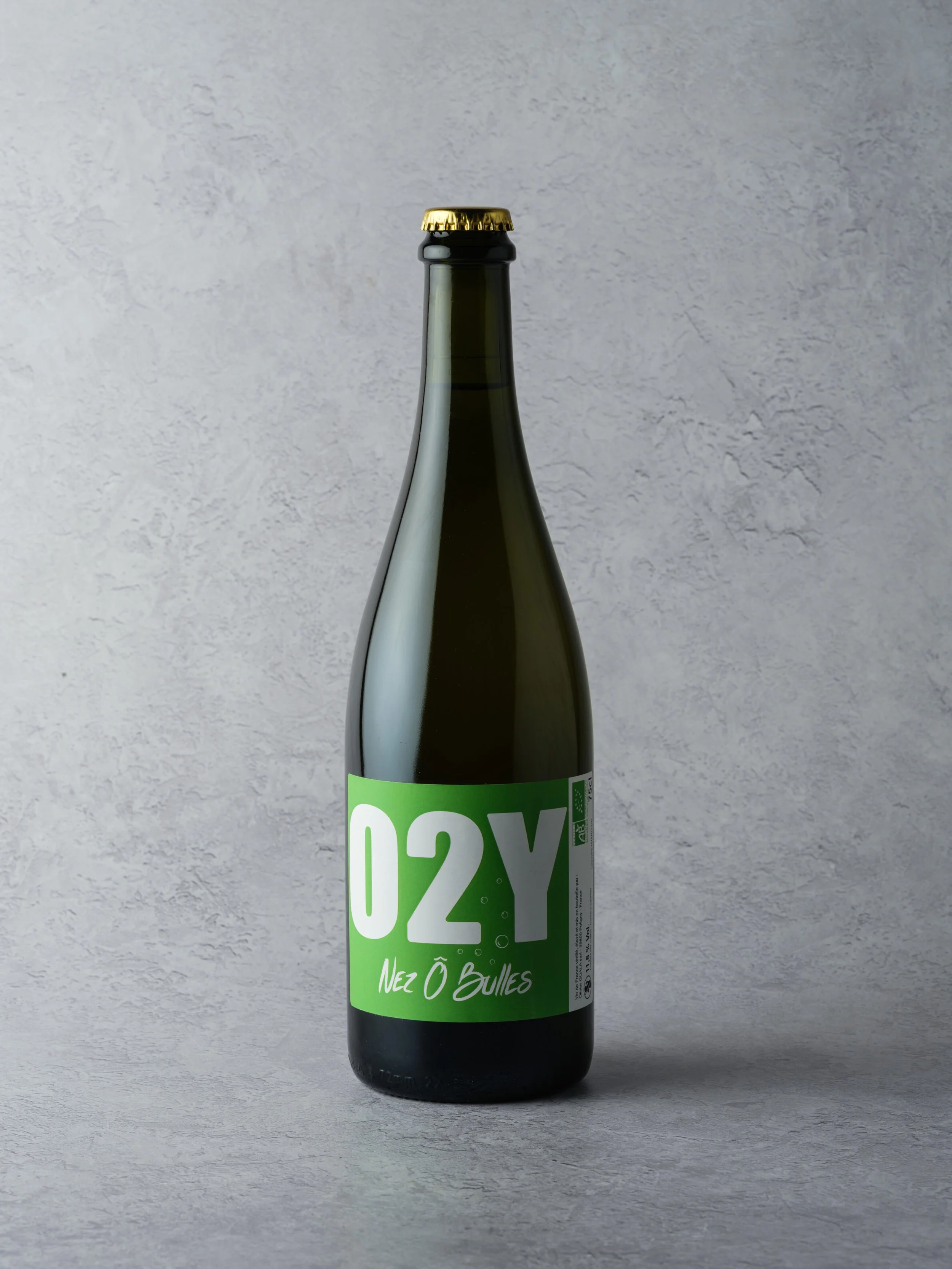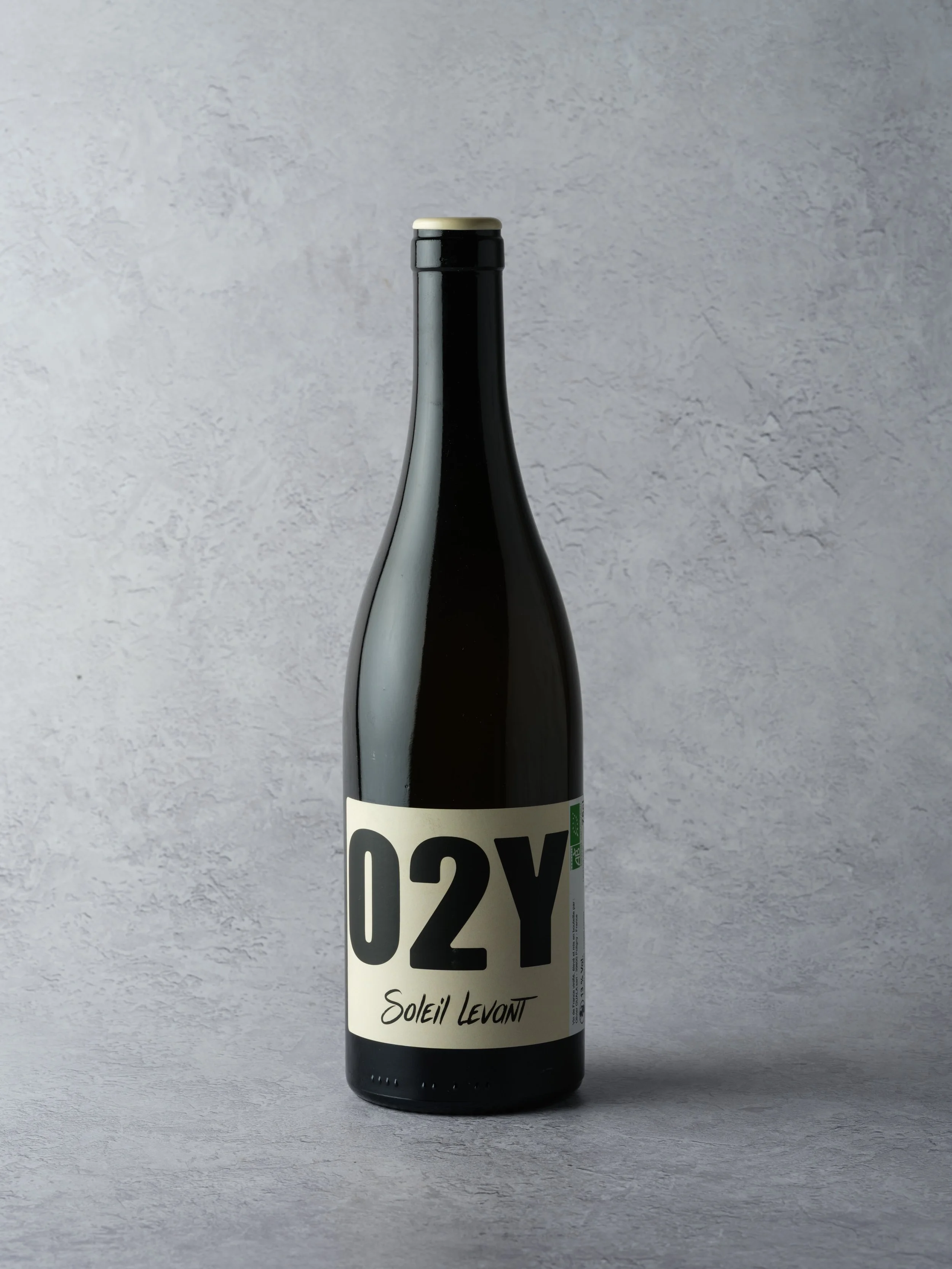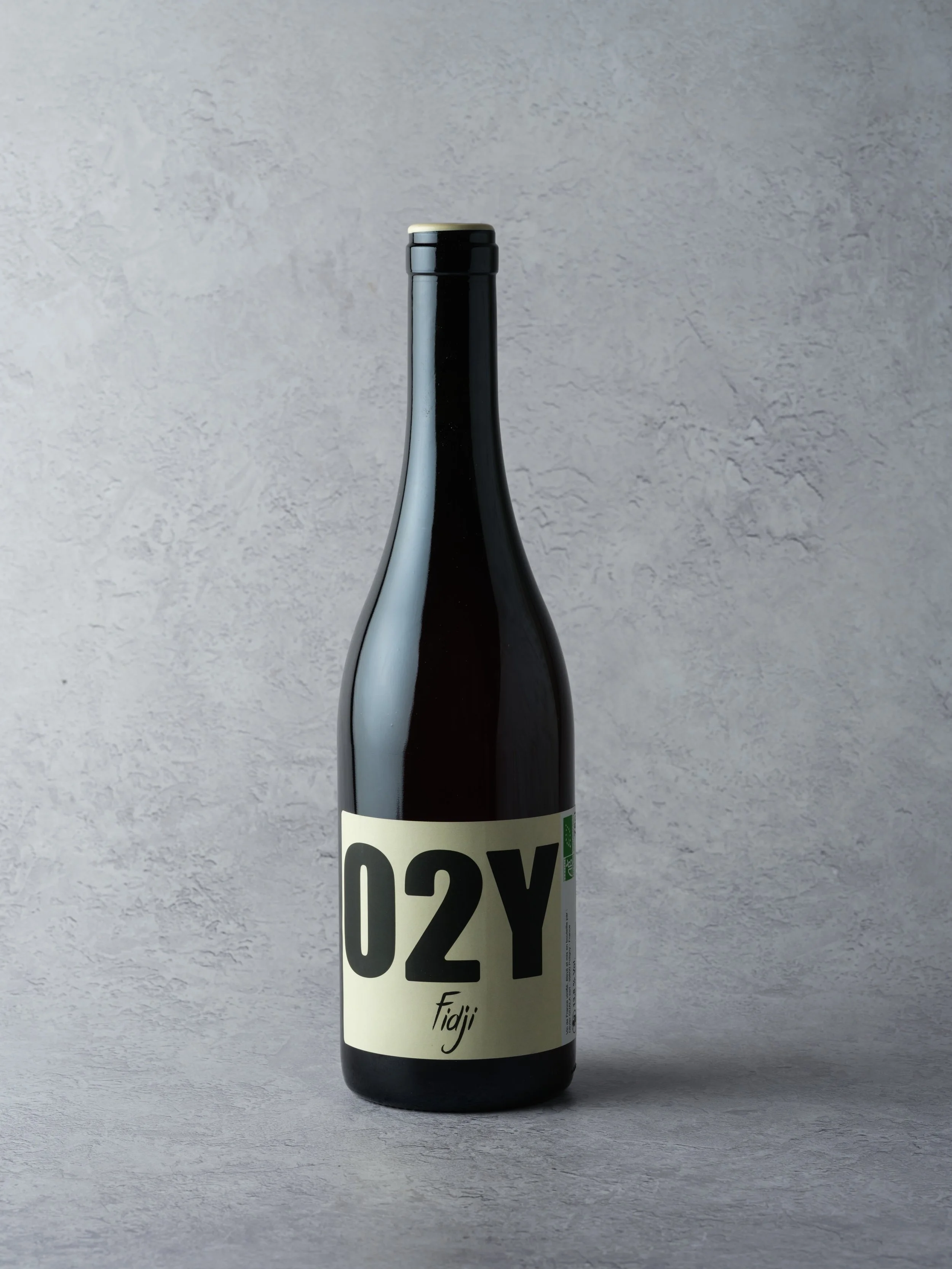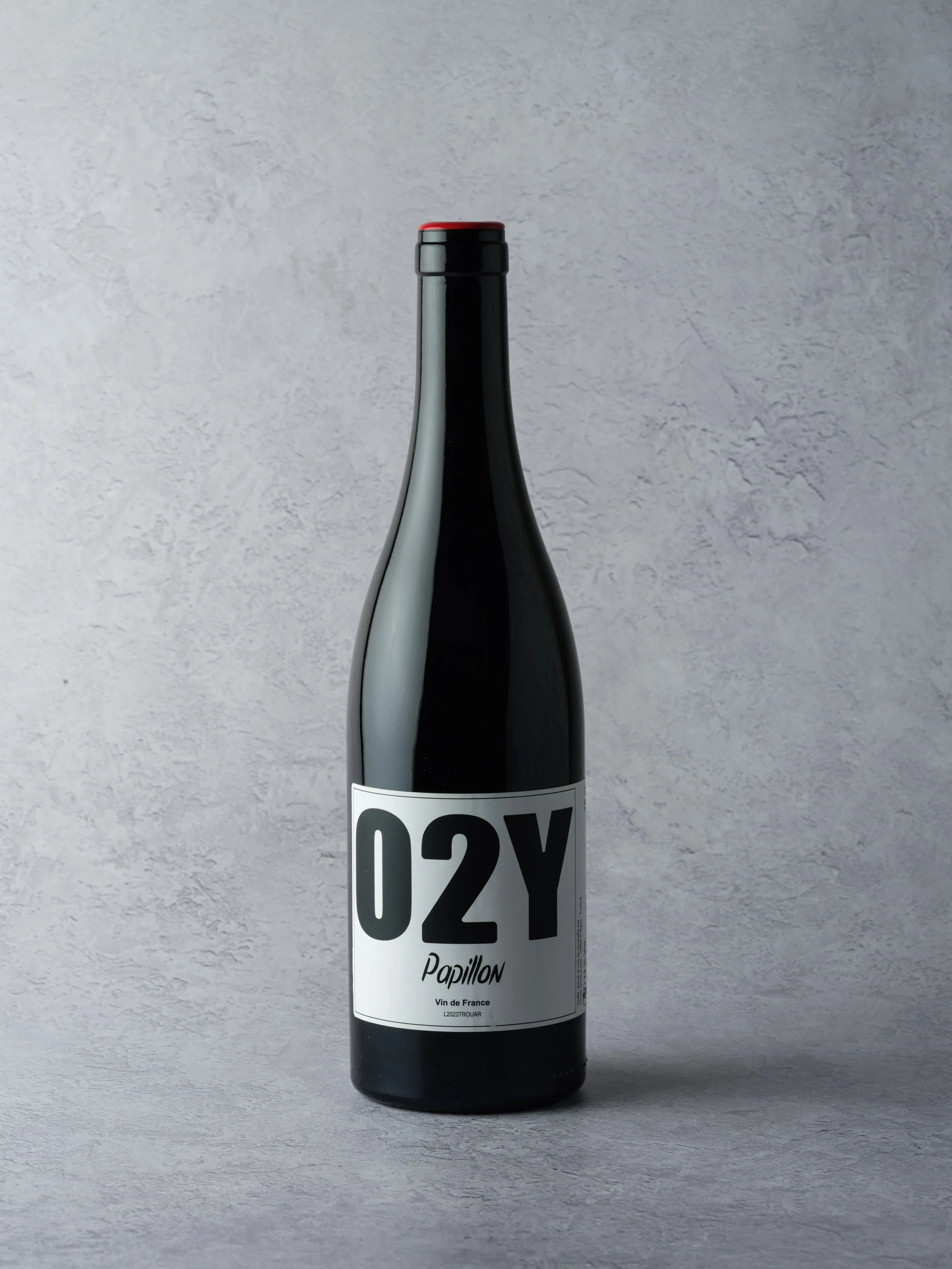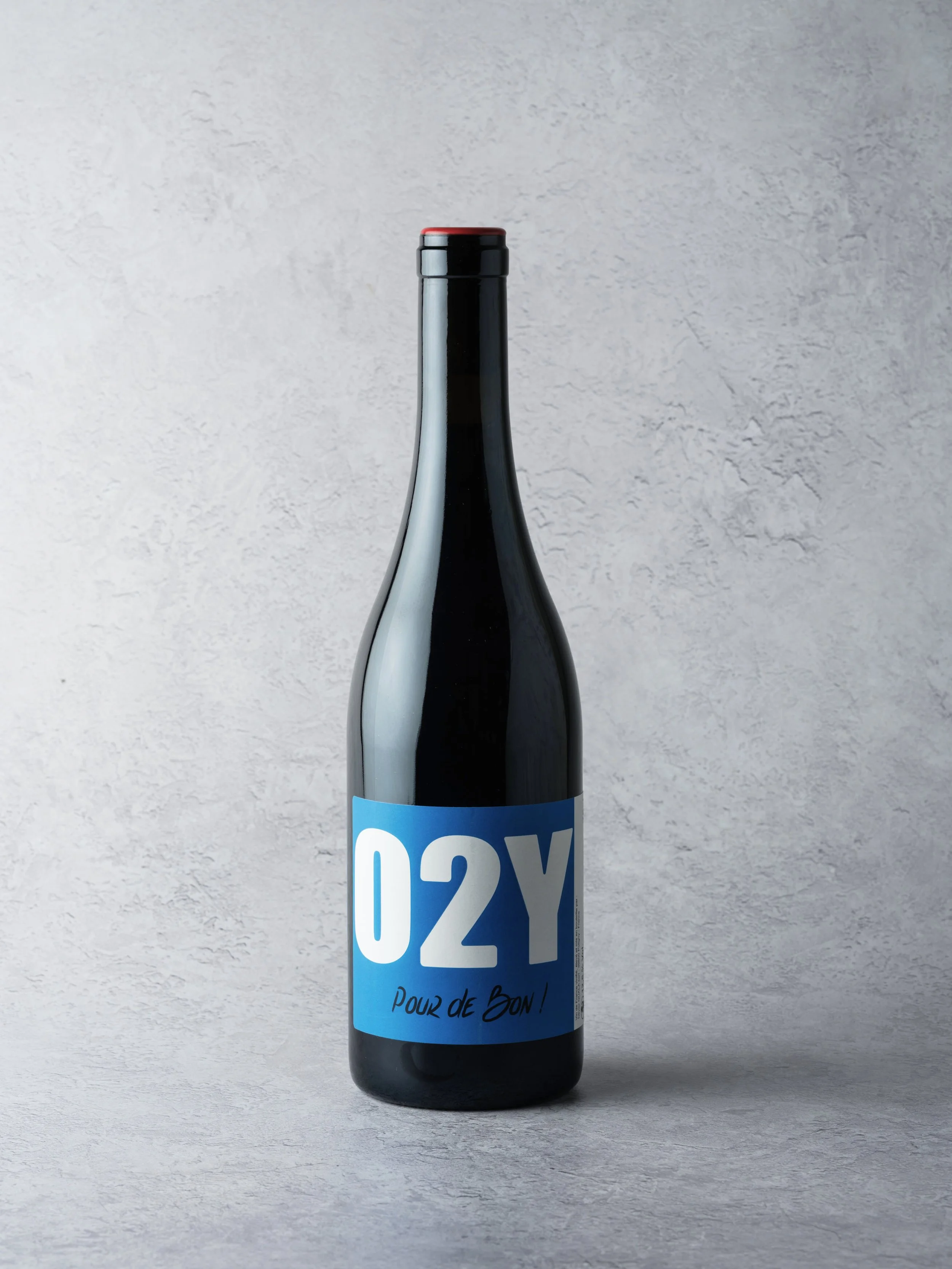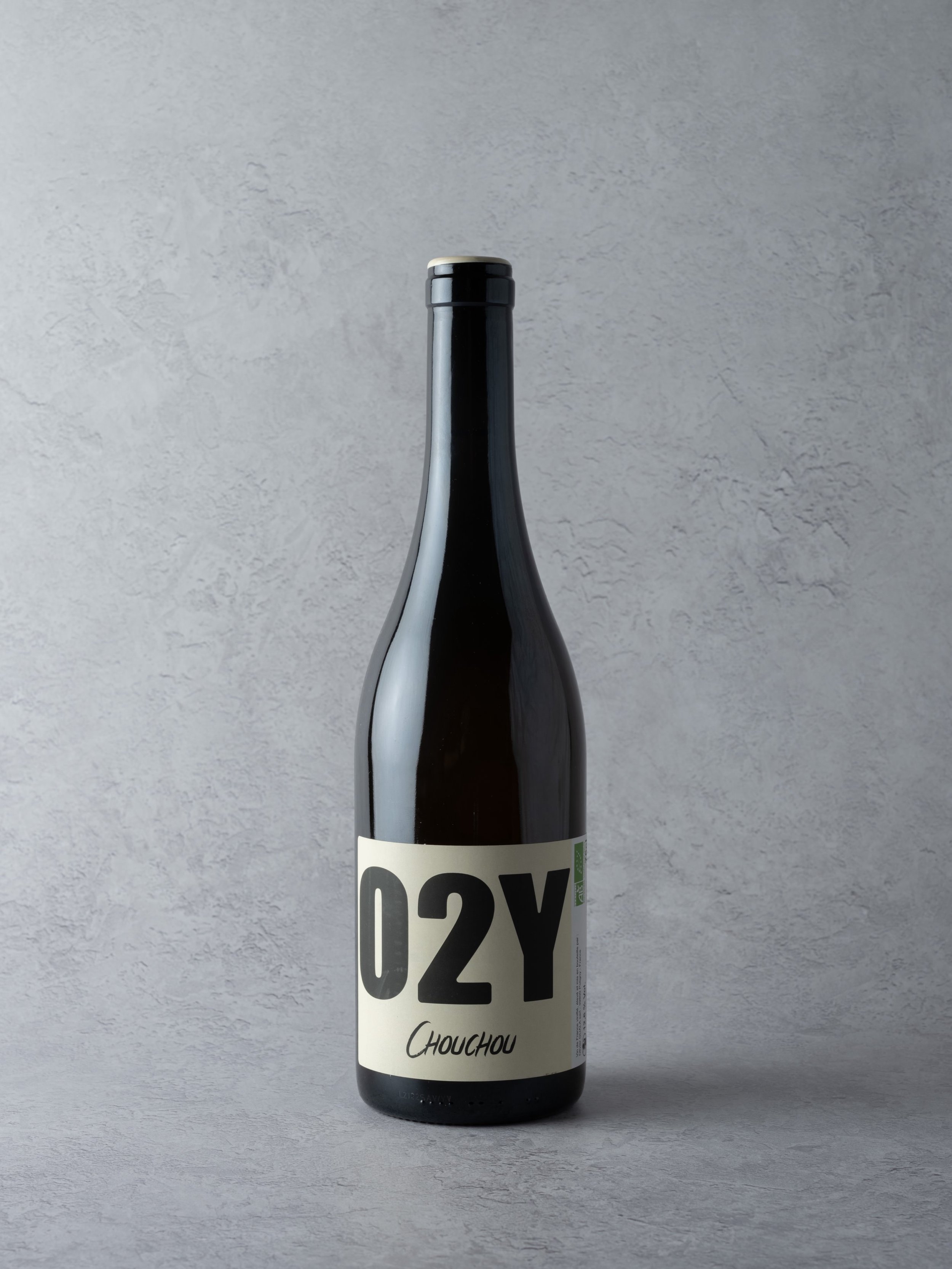O2Y
Poligny
Jura
The O2Y project was born from three friends - Olivier Guala, Yves Roy (of Domaine Nøvice) and Yoshinori Kuroda (assistant to Emmanuel Houillon at Domaine Overnoy). More recently Olivier took the reins of the business solely, and was joined by Romain Doerler, a young Alsatian oenologist who previously worked with Fanfan Ganevat in Rotalier. With this new partnership, also came for the first time, some of their own vines, located between Arbois and Poligny. Whilst they continue to buy grapes, they can now also produce wines from their own grapes - Pinot Noir, Poulsard, Trousseau and Savagnin.
The focus is on meticulous sourcing of top-quality, biodynamically-farmed grapes from neighbouring regions. These grapes are then vinified at Olivier's facility in Poligny. The approach employed for these wines mirrors the one used for their domaine wines, resulting in exceptional outcomes thus far.
Climate-induced anxiety, characterised by recurring spring frosts in April and subsequent hailstorms in July and August, has once again taken a toll impact on Jura and its terroir in 2021. To address the shortage of local grapes, they decided to broaden their sourcing efforts for the second release of O2Y, collaborating with growers from various regions, some closer to their home than others.
Nevertheless, they have maintained the relationships forged with the farmers of 2020, with whom strong bonds have been established. The output is now a mix of purchased grapes and domaine grapes, with some exciting new cuvées from both departments.
Pet Nat, Nez Ô Bulles
Vintage 2022
Style Sparkling
Region Belleville, Beaujolais
Varieties Marsanne / Roussanne
ABV 11.5%
Soils
Farming Organic
Winemaking A first Pet Nat from O2Y, a 50/50 split of Marsanne, Roussanne, sourced from the stony foothills of Beaujolais. Fermented in stainless steel tanks for 4 weeks before being frozen. Fermentation then restarts in bottle with 22g residual sugar, then élevage for 6 months.
Tasting Note
Elegant and fragrant sparkling with notes of green banana, lychee and elderflower shining through. Palate has lifting herbaceous note. Quite unique.
Soleil Levant
Vintage 2023
Style White
Region Alsace
Varieties Gewürztraminer
ABV
Soils
Farming Organic
Winemaking Gewürztraminer is direct pressed and ferments in 500l demi muid. It then spends 12 months resting in demi muid before bottling.
Tasting Note
Arbois, Passé Simple
Vintage 2020
Style White
Region Arbois, Jura
Varieties Chardonnay
ABV 13%
Soils Marl, limestone, clay
Farming Organic
Winemaking A warm sunny vintage, and a cuvée which took it’s time to find it’s way, before being bottled as Temps Libre. But the people at O2Y decided they wanted to add even more élevage, taking it to 48 months in barrel. Aged in several 228l barrels and then blended.
Tasting Note
Fidji
Vintage 2022
Style Orange
Region Alsace
Varieties Gewürztraminer
ABV 13.8%
Soils
Farming Organic
Winemaking The grapes are macerated on the skins for two weeks. Fermentation takes place in stainless steel tanks to maintain freshness.
Tasting Note
Papillon
Vintage 2023
Style Red
Region Jura
Varieties Trousseau
ABV 13%
Soils
Farming Organic
Winemaking A warmer year in 2023 allowed for this Trousseau to come in for the first time. A 3 week carbonic maceration of grapes in whole clusters.
Tasting Note Fans of Trousseau will know this instantly, with a vegetal structure backing up fresh and fruity flavours. Light on it’s feet and elegant.
Pour de Bon
Vintage 2023
Style Red
Region Burgundy
Varieties Pinot Noir
ABV 12.5%
Soils
Farming Organic
Winemaking Grapes sourced from the South of Burgundy in an old vineyard in the La Roche de Solutré region. The grapes see a 5 week carbonic maceration in stainless steel before 12 months of aging.
Tasting Note A full bodied Pinot, with structure and silky tannins. Blackcurrant anf fruit notes lead into a spiciness and complexity which show a real potential for aging.
Gringalet
Vintage 2021
Style White
Region Ayze, Savoie
Varieties Gringet
ABV
Soils Clay, limestone, red marl
Farming Biodynamic
Winemaking Due to the sudden passing of Dominique Belluard, Valerie took the decision to sell their entire harvest to family and friends. Luckily for us, Olivier managed to secure his own small allocation of Gringet grapes for O2Y. The fruit comes from some of the most iconic vineyards in Ayze, planed on a mix of calcareous and marl soils. It is pressed directly into cuve and aged on fine lees in barrel after fermentation and malolactic have completed.
Tasting Note
Côtes du Jura, L’Embellie
Vintage 2023
Style White
Region Côtes du Jura, Jura
Varieties Savagnin
ABV 13.5%
Soils
Farming Organic
Winemaking Ouillé Savagnin from Jura, bottled after two winters of élevage.
Tasting Note
Arbois, L’Originel
Vintage 2011
Style White
Region Arbois, Jura
Varieties Savagnin
ABV
Soils Clay, limestone
Farming Organic
Winemaking This is a one-of-a-kind find and a very special wine indeed. The Savagnin was harvested in 2011 and fermented in barrel with constant topping up over 11 years. As such the wine isn’t aged following the typical oxidative style, but rather experiences a totally different, yet equally delicious, kind of ageing, which is referred to as biological. In this occurrence the flor yeasts, in place of consuming sugars from the must they turn their attention to metabolising volatile acidity, glycerine and alcohol, breathing vast quantities of oxygen as they do so. The result is quite impressive, displaying a lighter, more elegant type of oxidation.
Tasting Note
Arbois, Temps Libre
Vintage 2020
Style White
Region Arbois, Jura
Varieties Chardonnay
ABV 12.5%
Soils Marl, limestone, clay
Farming Organic
Winemaking A Chardonnay true to its name, which took its time
before finding its way into bottle.
Made from old vines in northern Arbois, it was vinified through
direct pressing followed by a rather long fermentation and 36 months of
ageing in demi-muids. The wine is then racked and moved to tank a month prior bottling.
Tasting Note It has a bold character, offering plenty of depth
and richness due to its relatively long ageing as well as vintage conditions. It
is both indulgent, somewhat pastry-like, and complex. A gorgeous
expression of Jura terroir. Great ageing
potential, too.
Chouchou
Vintage 2022
Style White
Region Eguisheim, Alsace
Varieties Riesling
ABV 13%
Soils Clay, limestone, mussel chalk, marl
Farming Organic
Winemaking A 100% Riesling, direct pressed and fermented in a large wooden vat. The sunny character of the 2022 vintage brings out the aromatic quality of this emblematic Alsatian grape variety. However, the wood and bottle ageing somewhat softened its punchy nose making a rounder and slightly less obvious expression of the variety. As ever, bottled unfined, unfiltered and without any SO2.
Tasting Note Citrus is quite prominent here, in particular with a rather marked
grapefruit note. This is followed by floral tones and a round, spiced palate.
Côte du Jura, L’Autre P’tit Nico
Vintage 2021/22
Style White
Region Villette-les-Arbois & Poligny, Jura
Varieties Savagnin
ABV 13%
Soils Lias marl, clay, limestone
Farming Organic
Winemaking A non-vintage Savagnin cuvée which is the result of blending fruit from the 2021 and 2022 harvests. Given the painfully low yields and lengthy, seemingly endless
fermentations of 2021, it seemed logical to
blend the two vintages. The fruit also comes from two different villages, partly from vineyards in Villette-les-Arbois and the remainder from a single plot in Poligny, named Trouillot
Batard. Direct pressed Savagnin feed straight into barrels where it ferments dry over two and one winter respectively. The two wines are then blended and mature together for a further 6 months before bottling.
Tasting Note The combination of the two terroirs and the
different vintage characteristics create a delicate wine with elegance a very precise
nose. Floral with notes of lily and peach. The palate offers citrus combined with an honeyed quality and it end long and mineral on the finish.
Catamini
Vintage 2022
Style Orange
Region Meursault, Burgundy
Varieties Aligoté
ABV 12%
Soils Clay, limestone
Farming Organic
Winemaking The fruit, which comes entirely from a plot in Meursault (Burgundy) is split into two halves: one is direct pressed to bring freshness and vertcality while the other sees a 2-week maceration in cuve.
Tasting Note Catimini is fresh with a citrus and mineral
dominance, but it is also pleasantly textured offering a fine
tannic structure and salivating bitters due to its maceration.
L’Etranger
Vintage 2022
Style Orange
Region Beaujolais
Varieties Viognier
ABV 11.5%
Soils Clay, sand, decomposed granite
Farming Organic
Winemaking An unusual Viognier sourced from Beaujolais. This is macerated on the skins and aged in large wooden vats.
Tasting Note A rich, and tense wine named ‘L’Etranger’ as it is not your classic Viognier. Aromatic citrus, lends to buttery creamy nots and a pastry like depth. Seemingly accessible at first, and soon revealing a complex aromatic density.
Carrement
Vintage 2021
Style Red
Region Pyrénées-Orientales, Roussillon
Varieties Carignan
ABV 11.5%
Soils Clay, limestone, schist, gneiss
Farming Biodynamic
Winemaking Direct pressed Carignan sourced from Cassagnes, a small village at 340m of altitude in a unique terroir, located between Corbiéres and the Pyrenees. The grapes are farmed biodynamically, yet not certified, by Aymeric Paulet of La Vigne Grande. The juice spends approximately 7 hours in the press following a rather slow press cycle and allowing to extract colour and plenty of flavour despite a non-existent maceration.
Tasting Note
Vinum Bibo
Vintage 2021
Style Red
Region Saint-Germain-de-Nouelles, Beaujolais
Varieties Gamay
ABV 13.5%
Soils Clay, sand, decomposed granite
Farming Organic
Winemaking Grapes for this cuvée come from the southern part of Beaujolais, precisely from a village named Saint-Germain-des-Nouelles. This small old vine plot has been worked organically for many years and the soils are ploughed by horse. Full
carbonic maceration and fermentation without additives in tank.
Tasting Note Crunchy Gamay is all its simplicity. Direct and fruit forward. Dynamic in the glass with an earthy edge as it opens up.
Pourquoi Non?
Vintage 2021
Style Red
Region Eguisheim, Alsace
Varieties Pinot Noir, Pinot Gris
ABV 14%
Soils Clay, limestone, mussel chalk, marl
Farming Biodynamic
Winemaking This metisse is produced with fully de-stemmed grapes which come from the biodynamically-farmed vineyards of Domaine Hertz in Alsace. The Pinot Noir and Gris are co-fermented and undergo a 10-day maceration in fibreglass.
Tasting Note Pourquoi Non? was vinified by Yoshi. Juicy yet concentrated. Floral on the nose and clean on the palate. Fine grained tannins integrate beautifully with the refreshing acids and bitters.
Cabaret
Vintage 2021
Style Red
Region Chiroubles, Beaujolais
Varieties Gamaret
ABV 10.5%
Soils Sand, granite
Farming Organic
Winemaking Gamaret is an hybrid grape a cross of Gamay and Reichensteiner which is more often found in Switzerland and recently (2008) allowed to be cultivated in France too. In this particular case, the fruit comes from a vineyard in Chiroubles. The light colour, almost resembling a rosé is obtained by pressing the grapes in a slow, 8-hour press cycle. A different interpretation from the usual heavier and grippier examples of this variety.
Tasting Note
Le P’tit Nico
Vintage 2022
Style Red
Region Villete-les-Arbois, Jura
Varieties Poulsard
ABV 13%
Soils Clay, limestone, blue marl
Farming Organic
Winemaking The third vintage of this cuvée since the project started in 2020. The Poulsard is sourced from a 0.17ha plot in Villette-les-Arbois and comes from Nicolas Boudier’s estate, a dear friend of Olivier. 2022 underwent a 2-week carbonic maceration of fully de-stemmed grapes. Fermentation and ageing both take place in cuve.
Tasting Note Here you can clearly find the peppery and spicy character of the typical north Revermont terroir, offering generous fruit, while remaining fresh and mirenal.
